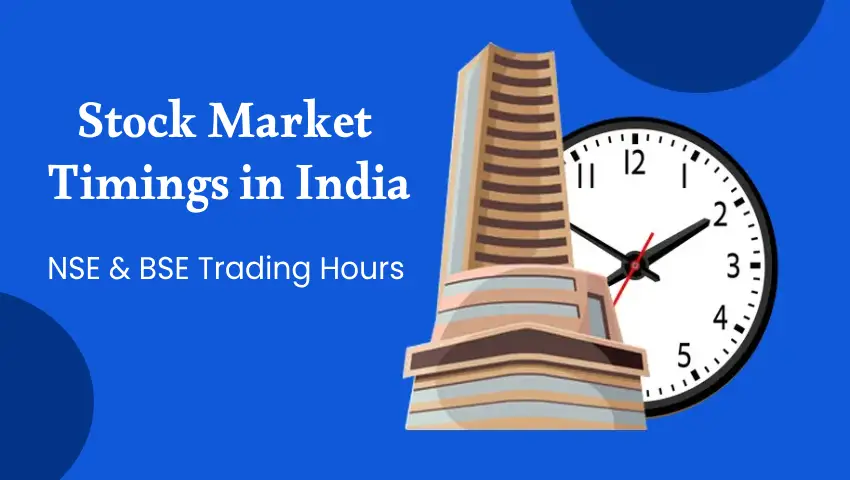
- 25/06/2025
- MyFinanceGyan
- 1926 Views
- 2 Likes
- Share Market
Stock Market Timings in India: NSE & BSE Trading Hours Explained
Trading in the Indian stock market is permitted only during specific hours on weekdays. Whether you’re investing through the National Stock Exchange (NSE) or the Bombay Stock Exchange (BSE), both follow identical trading schedules. Understanding the share market timings in India is crucial for placing trades strategically and making informed investment decisions. Here’s a complete breakdown of trading sessions, including pre-market, regular hours, post-market activity, and special sessions like Muhurat Trading.
Indian Stock Market Trading Sessions:
The stock market operates in three main segments throughout the day. Session Name Timings:
- Pre-opening Session 9:00 AM – 9:15 AM
- Normal Trading Session 9:15 AM – 3:30 PM
- Post-closing Session 3:30 PM – 4:00 PM
Pre-Opening Session (9:00 AM – 9:15 AM):
This 15-minute session allows investors to place or cancel orders before the market officially opens. It is divided into three sub-sessions:
9:00 AM – 9:08 AM:
- You can place, modify, or cancel orders.
- These orders get execution priority when regular trading begins.
- This window is crucial for investors aiming to secure favourable pricing.
9:08 AM – 9:12 AM:
- The order matching and price determination phase.
- Based on demand and supply, the opening price is calculated using a multilateral order matching system.
- Order modification is not allowed during this time.
9:12 AM – 9:15 AM:
- This is a buffer period between pre-opening and the main trading session.
- No new orders can be placed or modified.
- The system prepares to transition to the regular session.
Normal Trading Session (9:15 AM – 3:30 PM):
This is the main session where most retail and institutional trading occurs.
- Trading Method: Bilateral order matching based on demand and supply.
- High market activity during this time may lead to volatility, especially during market open and close.
- Investors can buy or sell equities, derivatives, and other instruments during this window.
Post-Closing Session (3:30 PM – 4:00 PM):
Even after the regular session ends, some market activity continues.
3:30 PM – 3:40 PM – Closing Price Calculation:
- The closing price is derived from the weighted average of trades between 3:00 PM and 3:30 PM.
- Important for setting opening prices for the next trading day.
- Benchmark indices like Nifty and Sensex also derive their closing values in this period.
3:40 PM – 4:00 PM – Post-Close Order Placement:
- You can place bids for the next day’s trade.
- If there are matching buyers and sellers, trades will be executed at the closing price, irrespective of the next day’s opening price.
- This is useful for those looking to lock in a price before market volatility sets in the next day.
After-Market Orders:
Though no trading happens after 4:00 PM, you can still place after-market orders (AMOs) via your brokerage platform. These are queued and executed once the market opens the next day.
Muhurat Trading – Diwali Special Session:
The Indian stock market remains closed on Diwali, but for religious and cultural significance, a special one-hour trading session known as Muhurat Trading is conducted.
- Date: Tuesday, October 21, 2025
- Time: Will be announced by NSE/BSE closer to the date
Muhurat trading is considered an auspicious time to make new investments and start fresh financial journeys.
FAQs – Indian Stock Market Timings:
- The pre-opening session starts at 9:00 AM.
- Regular trading begins at 9:15 AM.
Yes, both NSE and BSE follow the same trading schedule.
NSE operates from 9:15 AM to 3:30 PM for the equity segment.
Yes, after-market orders (AMOs) can be placed, but they’ll be executed the next day during regular hours.
No, the Indian stock market remains closed on Saturdays and Sundays, and on exchange-declared holidays.
Disclaimer:
This article is for educational and informational purposes only. The views expressed are personal and do not constitute investment advice or product recommendations.



